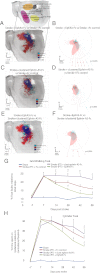A role for ephrin-A5 in axonal sprouting, recovery, and activity-dependent plasticity after stroke
- PMID: 22837401
- PMCID: PMC3421211
- DOI: 10.1073/pnas.1204386109
A role for ephrin-A5 in axonal sprouting, recovery, and activity-dependent plasticity after stroke
Abstract
Stroke causes loss of neurological function. Recovery after stroke is facilitated by forced use of the affected limb and is associated with sprouting of new connections, a process that is sharply confined in the adult brain. We show that ephrin-A5 is induced in reactive astrocytes in periinfarct cortex and is an inhibitor of axonal sprouting and motor recovery in stroke. Blockade of ephrin-A5 signaling using a unique tissue delivery system induces the formation of a new pattern of axonal projections in motor, premotor, and prefrontal circuits and mediates recovery after stroke in the mouse through these new projections. Combined blockade of ephrin-A5 and forced use of the affected limb promote new and surprisingly widespread axonal projections within the entire cortical hemisphere ipsilateral to the stroke. These data indicate that stroke activates a newly described membrane-bound astrocyte growth inhibitor to limit neuroplasticity, activity-dependent axonal sprouting, and recovery in the adult.
Conflict of interest statement
Conflict of interest statement: The authors received research funding from BioTime Inc. for a portion of these studies.
Figures







References
-
- Brown CE, Aminoltejari K, Erb H, Winship IR, Murphy TH. In vivo voltage-sensitive dye imaging in adult mice reveals that somatosensory maps lost to stroke are replaced over weeks by new structural and functional circuits with prolonged modes of activation within both the peri-infarct zone and distant sites. J Neurosci. 2009;29:1719–1734. - PMC - PubMed
-
- Li S, Carmichael ST. Growth-associated gene and protein expression in the region of axonal sprouting in the aged brain after stroke. Neurobiol Dis. 2006;23:362–373. - PubMed
-
- Carmichael ST, et al. Growth-associated gene expression after stroke: Evidence for a growth-promoting region in peri-infarct cortex. Exp Neurol. 2005;193:291–311. - PubMed
Publication types
MeSH terms
Substances
Grants and funding
LinkOut - more resources
Full Text Sources
Other Literature Sources
Medical
Molecular Biology Databases

